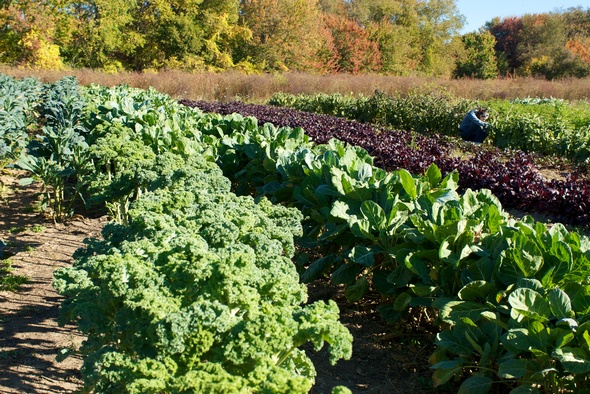Ann Arbor's newest CSA provides opportunities for former inmates

Living Stones Farm in Fall 2010
Photo | Amy Heath
By my count, there are more than 20 Community Supported Agriculture (CSA) farms in the Ann Arbor area. These direct farmer-to-eater type of businesses offer everything from fresh produce (like Beautiful Earth Farm) to frozen fruits and vegetables (Locavorious) to kimchi and sauerkraut (The Brinery) to chickens and eggs (Two Creeks Organics). And we now have year-round CSA options as well (like Sunseed and Portage River).
Most of the CSA farms in our area have a social as well as financial motivation — farmers want to create a caring social network, to support community food security or to demonstrate a sustainable future. Or all three. Going even further Ann Arbor's newest CSA, Living Stones Farm, was started directly in response to a specific social need.
Founding director Amy Heath started Living Stones after the imprisonment of a family member. She saw that growing food could be a path to "give citizens returning to society from prison the skills and sense of self-worth to create meaningful, crime-free lives."
At Living Stones, "a strong work ethic, restitution, acceptance, accountability, responsibility, decency, integrity and compassion are all a part of what is taught and lived." Heath says, "we've got to help people find employment. That would remove the temptation to recidivate for survival."
A farm with a purpose
Heath established the first location for Living Stones Farm in December of 2009 on a piece of property owned by the Ypsilanti Free Methodist Church. The farmer who was leasing the land for corn, soy and wheat gave Heath three acres near Textile and Carpenter roads.

Compost at Living Stones Farm
Photo | Amy Heath
According to Heath, "When (former inmates) get out on parole, they are introduced to us and to Habitat for Humanity. They come out to work on the farm, have a bonfire, cook out and eat together. We listen. They like having the opportunity to give back. The ones that keep coming back demonstrate that they are interested in farming. There haven't been many, but the ones that do are passionate."
Over the past year, about 30 people have come with the MPRI groups, and about five of those have formed longer term attachments with Living Stones.
Together with the other volunteers, Heath says "I worked their butts off. But they could stand there later on when it was beautiful, and they knew they'd done it."
Thanks to all that work, Living Stones did well at the Ypsilanti Farmers' Market as well as at the Dearborn Farmers' Market, where organically grown produce was in very short supply.
Heath says it was in Dearborn that one of their regular customers, a German lady, asked when they were going to start the Living Stones CSA. That customer was willing to sign up right there, and soon they had a list of 25 other regular customers who were interested.
That encouragement, along with the experience of growing bushels of beautiful produce, helped them take on creating a CSA. With income from the produce and the CSA, they are making their first official hires and realizing Heath's initial main goal of providing skills and meaningful paid work to citizens returning to society after incarceration.
Working together with volunteers and interns this season, their first paid employees will include Charlie, who will be in charge of composting and "soil creation," and William, who will be growing flowers and herbs for market.
The Living Stones CSA will last for 20 weeks, from June through October. They are offering two options — a "full share" to feed a household of four or five for $640, and a "partial share," for $400, which Heath explained will be more than a half share, and plenty for one or two people.
The vegetables are grown using all organic methods, and the CSA shares will be available at the Dearborn Farmers' Market on Fridays, at Real Estate One on State Street in Ann Arbor probably Tuesdays and at their second farm location near Campbell and Michigan Avenue near Ypsilanti.
Expanding the farm
In regard to that second location, Living Stones was able to secure more than an acre of land from the owners in exchange for vegetables. In August they plan to raise a hoophouse there that will help with year-round production and continuous employment.
Surrounded by button bush bogs, Heath says the site was once on the migration route for mastodons and is a butterfly haven. Heath has also learned that the property's previous long time owners include the Harwood family, who provided safety for escaped slaves and whose family cemetery is one of only two in the country known to have family members and slaves buried side by side.
Heath embraces those connections saying "all that significance around fighting for your freedom and staying free — it's so meaningful to us."
Remarking "while it's true that you have to set good boundaries —my heart's not that bleeding," Heath says she's "promoting the idea that you've got to cut somebody some slack and give them a chance. We all haven't lived perfect lives, and some of us have lived lives much tougher than others… I know what I was like when I was younger. The difference between me and them was that they got caught. There's really no room for judgment when it comes to this kind of thing."
With 45,000 inmates in 2010, Heath says that currently Michigan is among the states with the highest rates of recidivism in the country and that the state spends more on prisons than it does on education.
In university towns in particular, former inmates have a very difficult time competing for jobs. Heath says, "when it's between a grad student and a felon, who's an employer going to choose?"
Current Republican plans could make things even harder with the introduction of House Bill 4306, requiring institutions like prisons and schools to outsource their food service as a cost cutting measure. For prisoners, this has the result of removing one of the few opportunities for on-the-job training available "on the inside," (as well as removing the possibility of farm-to-institution relationships that pay local farmers to provide healthy food to inmates).
And once they get out, Heath says, "Snyder wants to permanently cut food stamps for people committing drug offenses — is that an incentive for them to live straight?"
Heath continues, "We've got to stay diligent on policy and what's happening in Lansing. I was never aware of this until it touched me personally, and I'm not proud to say that. When I found out, I could not just sit there and do nothing about it."
Some people might have simply written to their political representative and called it done. The fact that her response was to start a CSA farm as a way to "give people on the inside hope to remain law abiding and free" benefits them — and the rest of our community as well.
Re-thinking, re-skilling
Just as there are many "Edible Schoolyard" projects, there are also many "Edible Prisonyard" projects — in places as far away as Mozambique and as close as the Huron Valley Women's Correctional Facility (HVWCF) on Bemis Road in Ypsilanti. These projects have demonstrated advantages including increases in prisoner job skills, as well as reductions in food costs and recidivism rates. And they can provide additional benefits to the community.
For example, according to Horticulture Instructor Ellen Baron who has led the gardening program at HVWCF for the past nine years, the produce grown and donated by the inmates at the Huron Valley Women's Correctional Facility provided approximately 40 percent of all the fresh produce that Food Gatherers supplied in its food assistance programs in 2010.
Baron says they sent "lettuce, Asian greens, eggplant, tomatoes, potatoes, squash, watermelon — anything that grows in a vegetable garden. They (Food Gatherers) accept everything we send them. The women made a conscious choice to give the food to the community — they gain so much more by giving back to the community."
A recipe enjoyed on a Living Stones work day
This recipe comes from volunteer Joel Panozzo — now owner of The Lunch Room, a vegan food cart located at the new Mark's Carts opening in April 2011.
Around the Fire Farm Workday Chili
3 bell peppers (red, yellow, orange)
4 yellow onions
1 cup - corn (canned or fresh)
1 head of garlic
1/2 bunch - celery
8 carrots
8 cans diced tomatoes
4 cans chili beans
3 tablespoons honey mustard
1 tablespoon cumin
1/4 teaspoon cayenne (more or less as needed)
2 teaspoons Clancy's Fancy hot sauce
2 tablespoons olive oil
Saute chopped onions and minced garlic in olive oil over medium heat for 5 minutes. Add chopped bell peppers, celery, and carrots and heat for an additional 10 minutes. Add remaining ingredients and reduce heat and simmer for an hour. Place the stock pot on the campfire and simmer more.
Panozzo says "This chili refreshes those working hard on the farm for an afternoon of work."
Kim Bayer is a freelance writer and culinary researcher. Email her at kimbayer@gmail.com.


Comments
Rob
Sun, Mar 27, 2011 : 5:06 p.m.
Can someone fix the link for Portage River Farm? It's currently pointing to Sunseed.
Kelly Davenport
Sun, Mar 27, 2011 : 5:36 p.m.
The link is fixed now, thanks!
KeepingItReal
Sat, Mar 26, 2011 : 1:32 p.m.
Keep up the good works Livingstone.
Technojunkie
Sat, Mar 26, 2011 : 12:37 a.m.
<a href="http://www.feingold.org/enews/stittletter.html" rel='nofollow'>www.feingold.org/enews/stittletter.html</a> <a href="http://www.feingold.org/violence.php" rel='nofollow'>www.feingold.org/violence.php</a> Diet plays a very significant role in behavior. Processed food, especially what is charitably called "food" served by those food service contractors, is loaded with synthetic chemicals most of which are petrochemical neurotoxins. Programs like Living Stones Farm are exactly what is needed. HB-4306: <a href="http://www.legislature.mi.gov/%28S%282he2id55md0ndaapcvnum555%29%29/mileg.aspx?page=GetObject&objectname=2011-HB-4306" rel='nofollow'>www.legislature.mi.gov/%28S%282he2id55md0ndaapcvnum555%29%29/mileg.aspx?page=GetObject&objectname=2011-HB-4306</a>
Michelle
Fri, Mar 25, 2011 : 8:18 p.m.
For more information on Community Supported Agriculture, Living Stones Farm, or to sign up for a CSA share, please see <a href="http://www.livingstonesfarm.org/" rel='nofollow'>http://www.livingstonesfarm.org/</a> or contact info@livingstonesfarm.org. Keep up to date at <a href="http://www.facebook.com/LivingStonesFarm" rel='nofollow'>http://www.facebook.com/LivingStonesFarm</a>.
kathryn
Fri, Mar 25, 2011 : 6:22 p.m.
Thanks for bringing this "CSA" to our notice, but...it would be nice if you could write out or define "CSA" at least once in the opening paragraph, for those not familiar with the lingo.
Rich Rezler
Fri, Mar 25, 2011 : 6:27 p.m.
Thanks, kathryn. This file has been updated to define a CSA as Community Supported Agriculture.